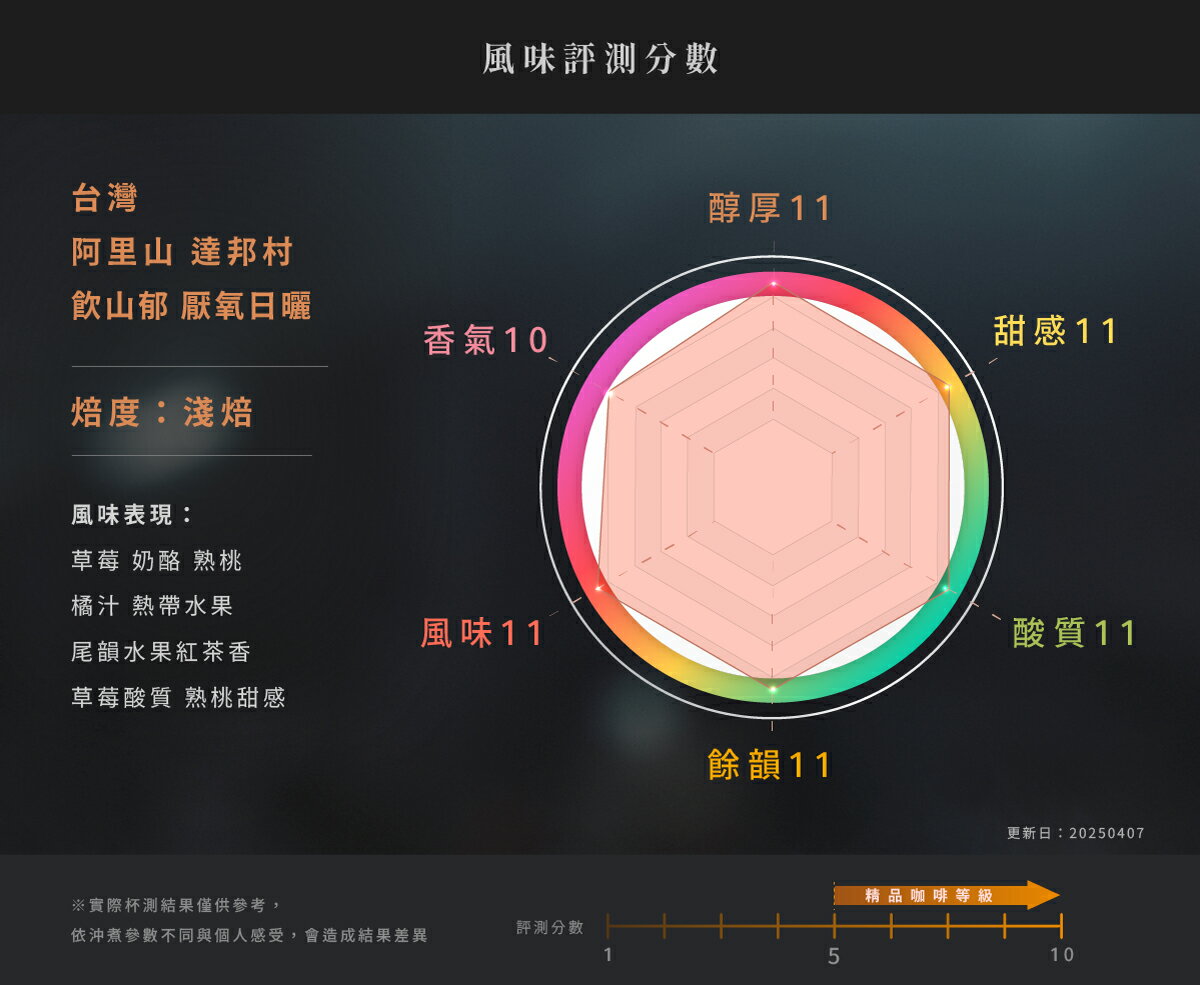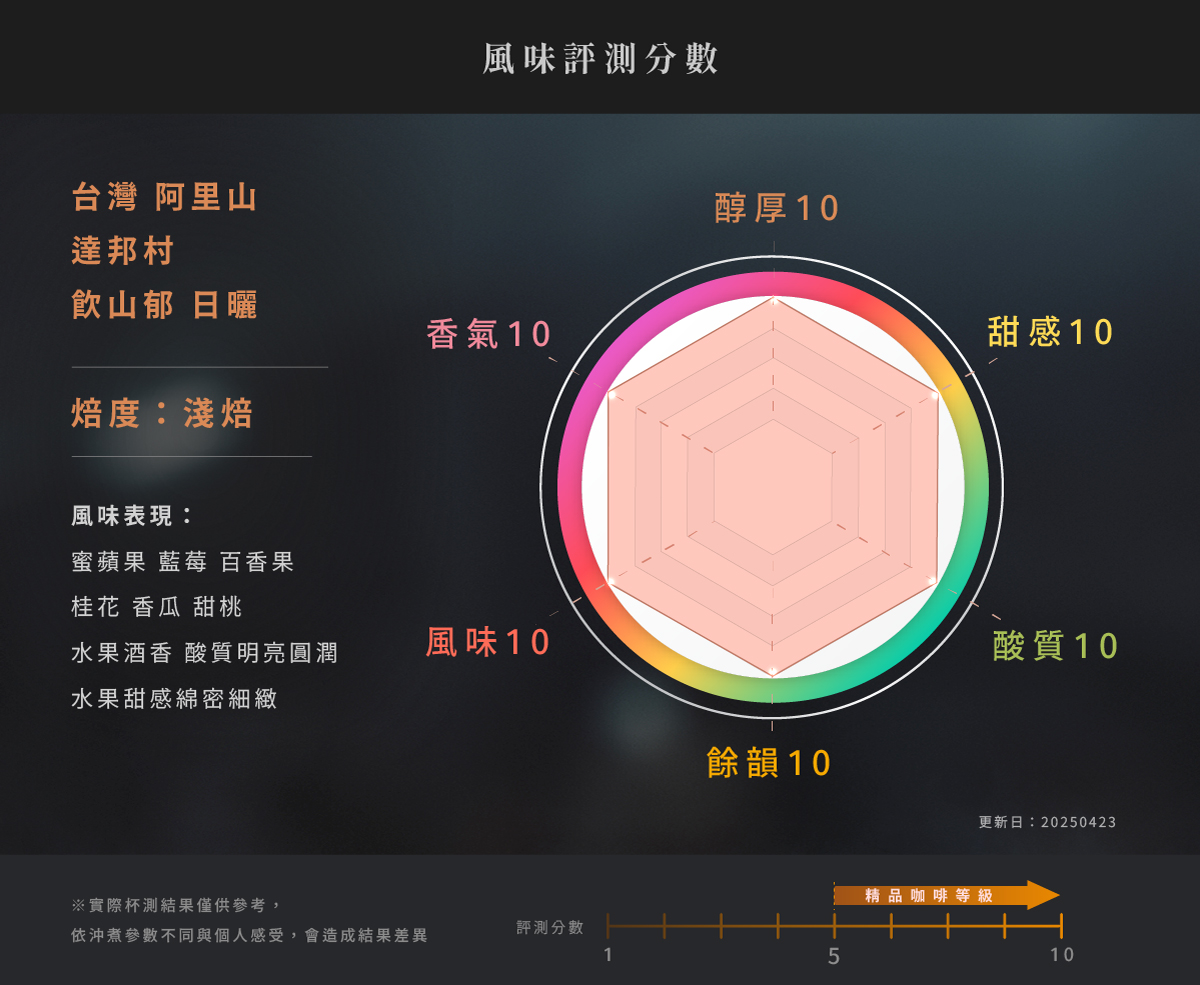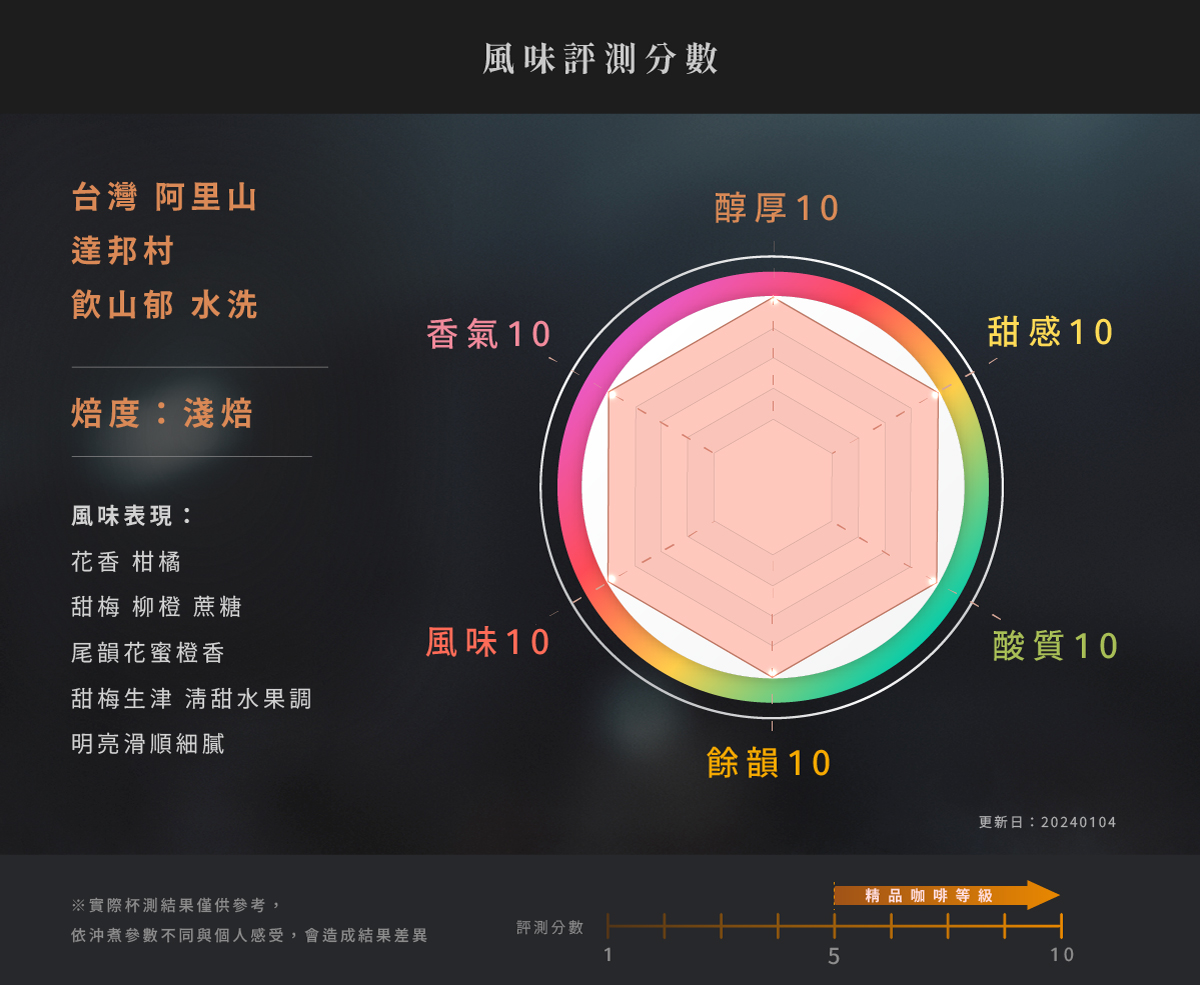


Celebration! The 2024 Taiwan Coffee Assortment & Grading system, TCAGs Evaluation
Alishanwin- Anaerobic Natural Process, proudly wins the Special Selection Award in the Other Process Category!
Taiwan Alishan Dabang Alishanwin Anaerobic Natural Special Selection Award Batch! Limited Edition, Available While Supplies Last.
Three Process Options Available for Taiwan Alishan Dabang Alishanwin Coffee Beans:
1. Taiwan Alishan Dabang Alishanwin Geisha Natural
2. Taiwan Alishan Dabang Alishanwin Anaerobic SL34 Natural

2. Taiwan Alishan Dabang Alishanwin SL34 Natural

3. Taiwan Alishan Dabang Alishanwin SL34 Washed








From Alishanwin Tea Garden: High-Mountain Coffee with a Masterful Flavor Experience.
In February of this year, the owner of Justin Coffee once again visited the Tea Garden (Alishanwin) at an altitude of 1,450 meters, where hundreds of coffee trees surrounded the garden. Despite a reduced harvest this year due to typhoons and pests from the previous year, Mr. Huang Chang-sheng, the tea garden owner, upheld his artisan spirit, meticulously picking ripe red fruits and caring for each coffee tree.
This year, the garden particularly capitalized on the natural advantage of the high-altitude's significant day-night temperature variation, extending the sun-drying process. By employing anaerobic sun-drying for post-processing, the coffee's flavor was made fuller and richer, imparting a strong fruity profile.
The Alishan coffee that Justin Coffee brought back comes from the Tea Garden in Dabang Village, Alishan, and is cultivated with great care by Mr. Huang Chang-sheng, a "Top 100 Young Farmer." This high mountain tea garden cleverly intersperses coffee trees with tea trees, creating an ideal growing environment. Nurtured by the high mountain climate and shaded conditions, the coffee beans mature slowly, developing a sweet and full-bodied flavor.


From Top 100 Young Farmer to Specialty Coffee Artisan, Award-Winning at First Attempt!
Huang Chang-sheng, the estate owner of Alishanwin in Dabang Village, Alishan, was already a highly recognized Top 100 Young Farmer with years of experience in tea cultivation. Now, he extends his artisan spirit to the realm of coffee. In his first participation in the 2024 inaugural Taiwan Coffee Assessment Grading System (TCAGs) competition, he won the Selected Award with his Anaerobic Sun-Dried Processed Coffee, showcasing remarkable skill!
Inheriting Traditional Craftsmanship, Masterfully Producing Specialty Coffee
Alishanwin Tea Garden not only continues traditional tea-making craftsmanship but also insists on using sun-drying methods for coffee post-processing. The coffee beans are exposed to natural sunlight in a greenhouse, preserving their original essence and allowing the coffee to present its unique flavor and aroma. Mr. Huang Chang-sheng, a top artisan in tea-making, has received honors such as: "Champion of the Alishan Tea Region Oolong Tea Production Skills Competition, Chiayi County", "Third Place in the National Oolong Tea Production Skills Competition," and "Fourth Top 100 Young Farmer." His expertise and dedication to quality infuse the essence of traditional tea-making into Alishanwin coffee, making it a specialty coffee with distinct Taiwanese characteristics.

"Savor the Mountain Aroma, Drink Alishan's Peak Fragrance; Verdant Trees Layer the Mountain's Lushness"
This phrase is not only the origin of the name "Alishanwin," but also embodies Mr. Huang Chang-sheng's philosophy. He views tea-making as a long journey, emphasizing that from a single tea leaf to a cup of tea, it requires the accumulation of time, experience, and perseverance. Growing up in a tea-making family, he deeply understands the hardship and value of this craft, and extends this spirit to coffee cultivation and post-processing.
This Alishan coffee is not merely a crystallization of the high mountain environment, but also embodies the dedication and persistence of the local farmers. Every cup of Alishanwin coffee is an ultimate experience of encountering the deep mountains, allowing people to savor the rich aroma and artisan spirit from Alishan.


Arabica Coffee Variety – Geisha/Gesha Variety
Geisha coffee, once named one of the "World's Top 10 Most Expensive Coffees" by Forbes, is a legendary name in the world of specialty coffee. However, there is significant confusion surrounding the Geisha variety, as several genetically distinct plant types are referred to as Geisha, many of which share a similar geographic origin in Ethiopia. Recent genetic diversity analysis conducted by the World Coffee Research confirms that the T2722 variety cultivated in Panama is both unique and consistent. When well-managed in high-altitude regions, this variety is strongly correlated with exceptional cupping quality and is renowned for its delicate floral aroma, jasmine notes, and peach-like fragrance.
Regarding the name "Geisha," the spellings "Geisha" and "Gesha" are often used interchangeably. This is related to phonetic transliteration, as there is no fixed translation from Ethiopian dialects to English. The variety was originally recorded as "Geisha" in planting records. Over the decades, coffee researchers and cultivation databases maintained this spelling, leading to its widespread promotion and use within the coffee industry. The variety was first collected from a mountain in Ethiopia, the name of which is typically translated into English as either "Gesha" or "Geisha."
In recent years, the cultivation of the Geisha variety has gained popularity worldwide, achieving remarkable success in major coffee competitions. This includes regions in Central and South America such as Guatemala, Costa Rica, El Salvador, Colombia, and Peru, where the variety has often been transplanted from Panama's T2722. Additionally, Taiwan has also begun cultivating Geisha in many high-altitude regions. Typically, the higher the elevation, the more enchanting the coffee’s flavor becomes.
Arabica Coffee Variety – SL34
The Bourbon variety of Arabica coffee is one of the closest to the original species. It was discovered on Reunion Island (formerly known as Bourbon) near Madagascar. Bourbon has its own unique characteristics, sharing a high-quality taste with Typica, featuring a wine-like acidity and a sweet aftertaste. Bourbon and Typica can be distinguished by their leaves and beans. Bourbon leaves are broader, and its coffee cherries are smaller but denser. Consequently, Bourbon beans are relatively smaller and rounder compared to Typica.
In Kenya and Tanzania, Bourbon was crossbred to produce hybrid varieties SL28 and SL34, which are highly regarded for their excellent flavor profiles. While Bourbon trees yield slightly more than Typica, their harvest cycle is still biennial, making them relatively low-yielding varieties.
SL28 and SL34 are coffee varieties developed in the 1930s by Scott Laboratories (SL). SL28 has genetic roots in Bourbon, Mocha, and Typica. The goal of developing SL28 was to create a high-quality coffee variety resistant to pests and diseases. While SL28 didn’t achieve the high yields initially anticipated, it gained fame for its remarkable sweetness, balance, and complex flavors, along with distinctive notes of citrus and dried plum.
SL34, similar in flavor to SL28, offers a richer and cleaner taste profile. It carries more Typica genes compared to SL28 and is better suited to withstand sudden heavy rains. Both varieties have become iconic in Kenya’s coffee industry due to their outstanding flavor profiles and adaptability to different growing conditions.

(Coffee Processes)
Coffee processing refers to the transformation of ripe red coffee cherries into dried green coffee beans. Each method has its pros and cons, influenced by the natural environment and specific needs of the production region. Therefore, each coffee-producing area adopts processing methods best suited to its conditions. This batch uses either the Natural Process or the Washed Process, which are summarized below:
Anaerobic Fermentation
In this method, coffee cherries are placed in a sealed container filled with carbon dioxide, creating an oxygen-free environment. The low-temperature conditions slow down the breakdown of mucilage sugars and cause the pH level to decrease at a slower rate, extending the fermentation time. This process enhances sweetness and achieves a more balanced flavor profile.
The slow and prolonged fermentation helps develop a smooth, rounded taste while preventing undesirable dryness or excessive acetic acid. The sealed environment also retains aromatic compounds, preventing them from evaporating. After the anaerobic process, the coffee is further processed using the passion honey method.
-----
Natural Process / Sundried / Dry Processed
Also known as the natural drying method or unwashed processing, this is the most traditional and commonly used method that does not involve water during processing. Originating in Ethiopia, coffee cherries are spread out in the sun to dry with their skins, pulp, and mucilage intact. Over the prolonged drying process, the seeds absorb flavors from the fruit layers, resulting in coffees with fuller sweetness and body, often with unique aromas.
Producers spread the cherries on sun-drying beds, which can be terraces or raised platforms. Over 3–6 weeks, the cherries undergo fermentation. Producers turn them regularly to ensure even drying and to prevent spoilage. During this time, sugars and mucilage adhered to the seeds contribute to their sweetness and flavor complexity. Once dried, the seeds are mechanically separated from the dried fruit layers. Natural-processed coffees are juicy, syrupy, and richly flavored—rewarding the effort invested.
-----
Washed Process (Wet Processed)
Also called the wet processing method, this technique involves removing the skin and pulp of the coffee cherries before drying. The seeds are then fermented in water tanks to remove residual mucilage from their surface. After fermentation, they are thoroughly washed and dried under sunlight or with mechanical dryers.
Compared to the natural process, the washed process produces a cleaner, crisper cup with lighter body. It often highlights bright, vibrant flavors and the complex acidity that defines specialty coffee. While washed coffees may still exhibit fruity characteristics, they are typically more refined and easier to distinguish, making them a hallmark of high-quality coffee.





【Manufacturer Information】
JUSTIN INTERNATIONAL FOOD ENTERPRISE CO., LTD.
Tel: +886-3-358-6611
1st Floor, No. 30, Lane 120, Daxing Road, Taoyuan District, Taoyuan City
▶This product is covered by a NT$10 million product liability insurance.
▶Food Industry Registration Number: F-165601955-00000-0
▶ Our company’s cupper is certified as a CQI International Coffee Quality Appraiser.



Recommended Products

※ For detailed shipping and payment information, invoices, overseas ordering instructions, etc., please click here to enter.
